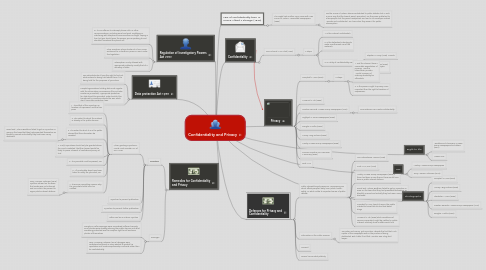
1. Regulation of Investigatory Powers Act 2003
1.1. s1 It is an offence to intercept phone calls, or other communications, including email and post. modifying or interfering with telephone communications is illegal. Taping is fine, but you should warn the person you're speaking to and shouldn't broadcast the phone call.
1.2. Clive Goodman phone hacker at of NOW was sentenced to 6 months in prison in 2007 under this legislation
1.3. Interception is only allowed with appropriate authority, usually that of a secretary of state
2. Data protection Act 1988
2.1. s32 Individuals don't have the right to find out what material is being held about them if it is being held for the purposes of journalism
2.2. People/organisations holding data must register with the information commissioner (this includes Freelance journalists). Appropriate protection for data should be provided. Data shouldn't be transferred to countries outside the EEC which don't have data protection laws.
3. Remedies for Confidentiality and Privacy
3.1. Injunction
3.1.1. When granting injunctions, courts must consider s12 of HRA 1998
3.1.1.1. 1. The effect of the injunction on freedom of expression and the free press
3.1.1.2. 2. The extent to which the material is already in the public domain
3.1.1.3. 3. The extent to which it is in the public interest that the information be revealed
3.1.1.3.1. David and Victoria Beckham failed to get an injunction in 2005 on the basis that they had presented themselves as blissfully married and actually they had rows, nanny disclosed.
3.1.1.4. 4. s12(3) Injunctions should only be granted where the court is satisfied that the claimed would be likely to prove a breach of confidence/privacy at trial
3.1.1.5. 5. The journalist must be present; OR
3.1.1.6. 6. All practicable steps have been taken to notify the journalist; OR
3.1.1.7. 7. There are compelling reasons why the journalist should NOT be notified
3.1.1.7.1. Terry v Person Unknown (2010) injuction refused on the basis that media was not informed and so couldn't be present to argue public interest defence
3.1.2. Injunction to prevent publication
3.1.3. Injunction to prevent further publication
3.1.4. Either can be an interim injuction
3.2. Damages
3.2.1. Douglas v Hello! Damages were considered sufficient remedy since photos were already entering the public domain and what was being protected was the couple's right to sell exclusive photos of themselves
3.2.2. Terry v Persons Unknown (2010) damages were considered sufficient as Terry wanted to protect his reputation and lucrative sponsorship contracts rather than his confidentiality
4. Defences for Privacy and Confidentiality
4.1. Public Interest/Iniquity SERIOUS WRONGDOING which affects people's daily lives, public health, safety or which relate to important issues of public debate.
4.1.1. Lion Laboratories v Evans (1988)
4.1.2. Cork v McVicar (1984)
4.1.3. Mosley v News Group Newspapers (2008) if there had been a Nazi theme, there would have been a public interest defence
4.1.4. David and Victoria Beckham failed to get an injunction in 2005 on the basis that they had presented themselves as blissfully married and actually they had rows, nanny disclosed.
4.1.5. Campbell v MGN (2004) it was in the public interest to know that she had lied about drugs
4.1.6. McKennit v Ash (2005) while revelations of serious misconduct might be justified in public interest, relatively trivial matters would not
4.2. Information in the Public Domain
4.2.1. Tony Blair and Nanny got injunction, despite the fact that 1mln copies of the newspaper were in the process of being distributed. Bet it didn't hurt that Mrs Blair was a big shot lawyer.
4.3. Consent
4.4. Person has courted publicity
5. Confidentiality
5.1. Coco Chanel v AN Clark (1969)
5.1.1. 3 steps:
5.1.1.1. 1. Is the material confidential?
5.1.1.2. 2. Is the defendant intending to make unauthorised use of the material?
5.1.1.3. 3. Is a duty of confidentiality owed?
5.1.1.3.1. Stephen v Avery (1988) Friends
5.1.1.3.2. Archer v Williams (2003) Employer employee relationship
6. Privacy
6.1. Campbell v MGN (2004)
6.1.1. 2 Steps:
6.1.1.1. 1. Did the claimant have a reasonable expectation of privacy? Was the information private? Would a person of ordinary sensibility be offended?
6.1.1.2. 2. Is the person's right to privacy more important than the right to freedom of expression?
6.2. McKennit v Ash (2005)
6.3. Creation Records v News Group Newspapers (1997)
6.3.1. circumstances can create confidentiality
6.4. Nightjack v Times Newspapers (2009)
6.5. Douglas v Hello! (2003)
6.6. Murray v Big Pictures (2008)
6.7. Mosley v News Group Newspapers (2008)
6.8. Princess Caroline von Hannover v Germany (2004)
6.9. Peck v UK
7. Law of confidentiality born in Prince Albert v Strange (1849)
7.1. The royals had another say in 2006 with HRH Prince of Wales v Associated Newspapers (2006)
7.1.1. Yes the Prince of Wales's diaries contributed to public debate, but in such a minor way that the breach wasn't warranted. Yes they were published to a few people, but they were handpicked, and sent in an envelope marked "private and confidential" so it was clear they weren't for public consumption
